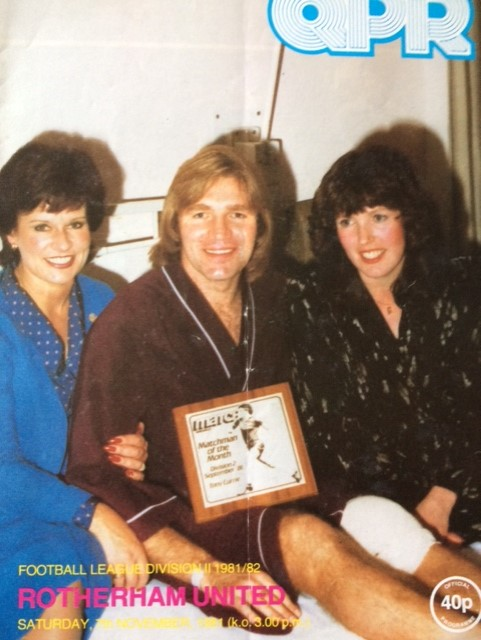Football League Division 2
Team: Burridge, Gregory, Fenwick, Waddock, Hazell, Roeder, Francis, Flanagan, Burke, Stainrod, Gillard
Sub: Sealy
Attendance 10,949
On 7th November 1981, Rotherham travelled to Loftus Road. Randall Northam later filed the following report:
‘Rotherham’s point at Loftus Road could help persuade the FA that the Omniturf pitch can be used for FA Cup ties. An announcement will be made on November 23.
No doubt before then QPR manager Terry Venables, never one to miss a trick, will point out that if the team with the worst away record in the Second Division can draw on this pitch it cannot be that much of an advantage to his team.
But Venables knows it was not like that on Saturday and that, even though he will not admit it, the pitch is clearly a considerable help to his team.
Regrettably, every match at Loftus Road this season is bound to invoke an inquest.
Rotherham manager Emlyn Hughes sensibly suggested it should wait until the end of a season in which QPR are grabbing most opportunities to improve their record.

After losing to Luton in their first match they had won six without conceding a goal.
They should have buried Rotherham as well but lacked craft without Tony Currie’s subtle, accurate, passing and with Gerry Francis missing after a collision with a post in the 5th minute when he scored the first own-goal of his career.
Rotherham, and particularly big men like Stancliffe and Green, should have felt uneasy on the artificial surface even after preparing as well as possible by accepting QPR’s invitation to train on the pitch.
They defended stoutly, sometimes frantically, but always bravely and deserved a point.
Hughes, naturally, was pleased with the result if not the performance, but after the team’s first experience on this surface it would be difficult for him to be too critical.
This pitch gives QPR a considerable advantage in that they can practice on the Omniturf all the time.
QPR’s players know that stopping and turning is difficult, full-blooded tackling is almost impossible, and the bounce of the ball is much higher.
They were prepared to body-check if beaten and to nudge opponents off balance. Referee Brian Stevens did not seem to compensate.
But Mick Gooding, small, quick and agile, was clearly at home on the surface and, together with Tony Towner, who is of similar build, looked most at ease going forward.
Not that Rotherham did much attacking. After their early good fortune, which followed a miscue from Gooding, they were entrenched. Yet, they could have won.
Just before half-time, Gooding broke quickly and provided a straight-forward opportunity for Ronnie Moore.
Instead, they at last succumbed ten minutes from time when Mike Flanagan bustled his way through a crowded penalty area and blasted a close range shot wide of Ray Mountford.
Rotherham, as Hughes pointed out, kept getting pegged back in the last few minutes, but if they keep playing with such spirit it will not take long before they win their first away match.’
After Gerry Francis was stretchered off, he was then rushed to hospital with a suspected broken knee-cap.
The following week, Simon Stainrod nabbed a hat-trick in the 3-1 win at Sheffield Wednesday.
Steve Russell
